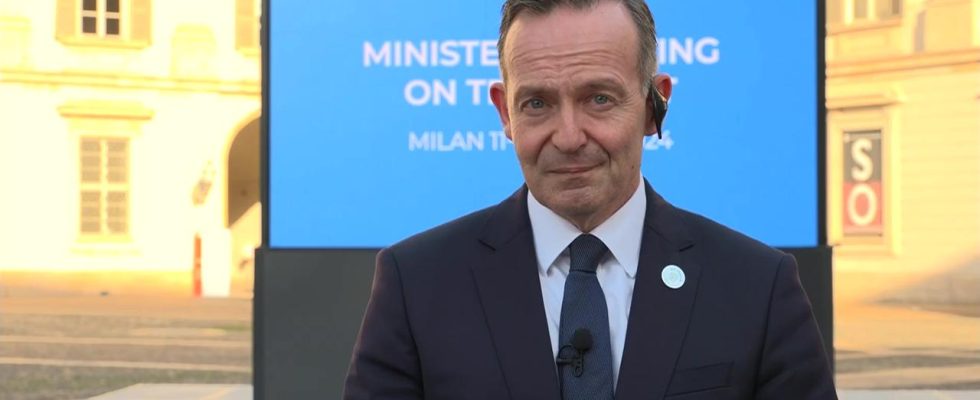The Federal Environment Agency also disagrees, but Transport Minister Wissing stands by it: he said that the current climate law can only be complied with with “rabid measures” such as driving bans daily topics. A speed limit doesn’t do enough.
Transport Minister Volker Wissing has in the daily topics defended his threat of driving bans. The climate goals that were set out in the Climate Protection Act of 2019 cannot be achieved in the transport sector other than with “rabid measures”.
This can only be avoided if the current climate protection law, which was passed by the CDU, CSU and SPD at the time of the grand coalition, is changed and transport is thereby released from the obligation to save more CO2. “This idea of looking at sectors is simply not good because it leads to burdens for the population. For no reason. That’s why the law is the problem.” The focus on individual areas that the Climate Protection Act in its current form provides for “is wrong and must be changed”.
What does the current climate protection law provide?
Germany’s climate protection goals are bindingly regulated in the law. It envisages that greenhouse gas emissions will be reduced by 65 percent by 2030 compared to 1990. Permissible annual emission levels have been set for individual sectors such as industry, energy, transport and buildings. The key point so far is the following mechanism: If sectors fail to meet the requirements, the responsible federal government departments have to take action with emergency programs. Last year, the transport and building sectors missed the permitted annual emission levels. According to the current legal situation, the transport department must now respond with measures to reduce emissions.
Criticism of the Greens
Wissing criticized the current regulation, according to which his ministry has to save CO2, although the climate targets are met across departments, cannot be communicated to people: “We simply have to tell the citizens clearly now: If the Greens don’t move and this law stays, it will “They have to expect restrictions. Even though the climate protection goals are being met. And I think that is inexplicable.”
Wissing emphasized that the cabinet had already agreed nine months ago to overturn the sector targets. However, the Bundestag has not yet voted on it. This has consequences, “and I warn against them very clearly.”
When asked why he had not done more to reduce CO2 emissions in his department in the past two years, the FDP man explained that a lot had already happened – for example in rail transport: Here there is the “Deutschlandticket, the high investments in the railway”. With regard to the automobile sector, which is responsible for the vast majority of emissions, Wissing said: “We have 45 million vehicles with combustion engines in Germany. And citizens cannot buy a new car from one year to the next. Besides The climate-neutral vehicles are not even available.” Therefore, short-term adjustments are “simply not possible”.
Discussion about speed limits as a “distraction”
However, the minister still does not want to tackle a measure that would immediately reduce emissions and which a majority is in favor of: a speed limit. “This is not a solution, not even close to it,” said Wissing. In order to meet the targets for the transport sector, 22 million tonnes of CO2 must be saved. According to figures from the Federal Environment Agency, a speed limit would save around seven million tonnes, within a very short period of time and without major investments.
Wissing still rejects the idea: “Then they would have the situation where they basically have to achieve the rest not with a two-day driving ban, but with a day and a half driving ban.” He is “no longer prepared to distract citizens from where the actual problem lies, namely in the sectoral view of the Climate Protection Act” with any discussions about the speed limit.
Criticism from experts
However, experts consider the threat of a driving ban to be excessive and unnecessary. The Federal Environment Agency clearly contradicted this. “Of course we don’t need driving bans,” said the head of the authority, Dirk Messner, to Spiegel. “Such bans are not seriously discussed and scare people for no reason.”
The federal government must indeed act quickly so that the transport sector meets the climate targets, Messner continued. “But that doesn’t automatically mean that there will suddenly be a risk of driving bans if we take climate protection in the transport sector seriously.”
The interview with Wissing for the tagesthemen on Friday was recorded in the early evening and will be broadcast on television in slightly shortened form.

